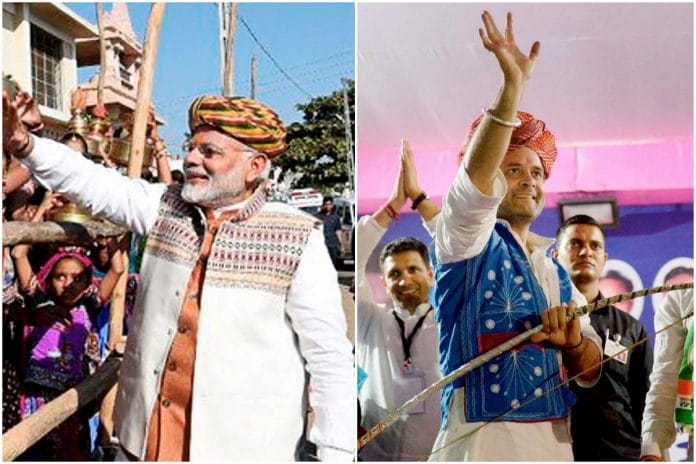National level leaders today are like banyan trees under which nothing grows; several states are experiencing the same leadership deficit.
Great leaders create more leaders, not followers. This is not true in Gujarat’s politics today. The BJP is facing a serious leadership deficit after Narendra Modi and Amit Shah moved to New Delhi as the supreme leaders of the party.
Had it not been for the scarcity of credible and popular state-level leaders faced by both the BJP and the Congress, Prime Minister Modi and the Congress vice-president Rahul Gandhi would not have been compelled to micromanage the poll campaign and put their personal political prestige at stake.
The absence of strong, visionary regional leaders who are popular and can inspire the party rank and file has compelled both the parties in Gujarat to keep the name of their chief ministerial candidates a secret.
In case the Congress steals a victory, would the mantle fall on the state party chief Bharatsinh Solanki, national spokesperson Shaktisinh Gohil, or former leader of the opposition Arjun Modhvadia?
In case the BJP wins again, would present chief minister Vijay Rupani continue, or would he be replaced by his deputy Nitin Patel, or cabinet colleagues Bhupendrasinh Chudasama or Ganpat Vasava, or by central ministers Purushottam Rupala or Mansukh Mandaviya?
Some even speculate a wild card entry BJP chief Shah, a la Manohar Parrikar in Goa, to salvage the sinking ship, in case the BJP manages only a slim majority. But Shah is least likely to prefer such confinement to Gujarat when 13 BJP chief ministers and powerful Union cabinet ministers report to him. Modi, too, would be chary about sparing his most trusted lieutenant before the challenging 2019 Lok Sabha election campaign.
Neither Modi nor Gandhi would be available for active state duty once the Gujarat elections are over. Factionalism would resurface after results, and could be followed by weak and fragile governments.
In a sense, the present leadership deficit is reminiscent of similar situations in the past. Ironically, a state polity mentored by Mahatma Gandhi, Sardar Patel and Morarji Desai has had an unusually high turnover of chief ministers, barring the exceptional uninterrupted rule of Modi for thirteen years from 2001 to 2014. Out of the 16 chief ministers of Gujarat since its creation in 1960 through the bifurcation of the bilingual Bombay state, only three–Hitendra Desai, Madhavsinh Solanki and Modi–could complete a full five-year term. The average tenure of the remaining 13 chief ministers comes to a poor 2.5 years.
As Indian democracy is increasingly shaped by regional dynamics and developments in recent years, the relevance of state-level leadership cannot be overemphasised.
Out of India’s 14 Prime Ministers so far, six had previously held the position of chief minister. Two of them, H. D. Deve Gowda and Narendra Modi, transited to the Prime Minister’s position directly from a chief ministerial role. The remaining four – Morarji Desai, Charan Singh, Vishwanath Pratap Singh and P.V. Narasimha Rao –moved to the national political domain long before taking over as prime minister, and had even held key cabinet portfolios, including the position of the Deputy Prime Minister in case of Morarji Desai and Charan Singh.
In India’s federal system, accomplished and popular state-level leaders are essential not just for winning elections but also for delivering governance and development at the grassroots level.
The present situation in Gujarat is not unusual or exceptional in the context of the politics in India’s states. Several states that are under the rule of national political parties are experiencing the same leadership deficit.
In the cutthroat world of politics, most national leaders are fearful of devising a succession plan and nurturing the development of the second and the third rungs of leaders in their party organisations. In an effort to remain unrivalled and superior, national leaders cast off the ladder they used to reach their positions. The higher leadership in the national political parties today is like the proverbial banyan tree, with its huge, luxuriant herbage of thick leaves and branches, under which nothing grows.
Unless this changes, Indian democracy appears less likely to grow out of the patron-client style of leadership functioning.
Meanwhile, the all-important question – who will be the next chief minister of Gujarat – remains mysteriously unanswered by both the BJP and the Congress.
Amit Dholakia is professor of Political Science, Maharaja Sayajirao University, Vadodara.







The organisational and command structure of Sangha Pariwar is quite complicated and unique and is deeply rooted in Indian culture and traditions.It is not so simple and transparent as we see in any present day political party which has been copied from western world.Here the leaders are made and groomed carefully under strict t dsicipline in Sakhas and after scrutiny sent to various organisations of the Pariwar including BJP. Ii is unlikely that this party will ever suffer from dearth of leadership at any level.
The organisational and command structure of Sangha Pariwar is quite complicated and unique. It is not so simple and transparent as we see in any present day political which has been copied from western world.Here the leaders are made and groomed carefully under srict dicipline in Sakhas and after scrutiny sent to various organisations of the Pariwar including BJP. Ii is unlikely that this party will ever suffer from dearth of leader ship at any level.